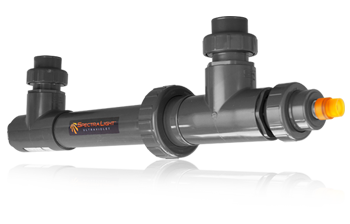Shopping Cart
All orders qualify for risk-free 30 day trial & complimentary US shipping!
-- No items so far --
Total:
0
Support
Need help? Our Pool Experts are here to help.
All orders qualify for risk-free 30 day trial & complimentary US shipping!
-- No items so far --
Total:
0
Need help? Our Pool Experts are here to help.
Pool ionizers, sometimes called mineralizers, are based on the principle of adding copper to pool water. Ionizers release heavy metals that can kill bacteria when exposure is long enough. But pool ionizers have drawn a lot of scrutiny from government authorities. These authorities argue that silver and copper ionizers have not been proven adequately effective in controlling human pathogens in a swimming pool or spa.

There are two basic types of pool ionizers: electric pool ionizers and mineral cartridge ionizers. The basic concept is the same. These devices add copper and sometimes other heavy metals to the water. Electric ionizers charge copper or other heavy metal plates with electricity and release copper or other metal particles into the water. Cartridge ionizers use a mineral pack to release the metals. Some ionizer manufacturers claim to eliminate the use of all chlorine and residual sanitizers. The problem is that these chemical free pools have been proven unsafe for swimmers.
Although pool ionizer companies claim that their device allows for a chemical free pool, there is no such thing as a safe chemical free pool. First, pool ionizers are not capable of oxidizing pool water. Second, copper and other heavy metal pool ionizers are slow acting, and require several hours to pass before the heavy metals may have any effect on bacteria and other pathogens.
In 2004, The Australian Government took action against a number of companies selling pool ionizers. Pool ionizers are often sold as an alternative to chlorine and/or chemicals. These products claimed to work by releasing silver ion, copper ions, or both into pool water. In many cases, these products were promoted as a replacement for all chlorine. The Australian government noted that these metal ion-based products had not been assessed according to scientific standards for safety or efficacy. The government had scientific data that called the efficacy of these products into question. The Australian government had a serous concern about these products, since waterborne pathogens transmitted to swimmers through pool water can be dangerous, or worse, deadly
The World Health Organization data confirms the Australian government findings. According to the WHO, a fast, germicidal kill rate is required to ensure bacterial and viral infection via pool water does not occur, even when the pool is used frequently. A biocide is a chemical substance that eradicates or controls harmful organisms. The need for biocidal action eliminates the use of silver and other heavy metals for pool water disinfection, since a long exposure period is required to show any effect. It was also noted that quick, sensitive, analytical field procedures for measuring low concentrations of silver is not available. What this means is pool ionizers cannot kill pathogens quickly enough to eliminate the use of chlorine.
When water quality is critical, commercial pool and spa operators turn to ultraviolet (UV) pool systems. Ultraviolet light disinfection lowers chemical demand, eliminates chlorine by-products and makes any pool safe, healthy and easy to manage. And UV is based on sound science, drawing applause and excellent reviews from both the WHO and Professional Pool Operators of America.
The World Health Organization speaks highly of UV and its ability to kill microorganisms at free chlorine concentrations of 0.5 ppm or lower. According to the World Health Organization, lower free chlorine concentrations (0.5 ppm or less) are adequate when chlorine is used in combination with UV disinfection. The WHO goes on to explain that UV purifies circulating water. It inactivates microorganisms and breaks down some pollutants (e.g. chloramines) by photo-oxidation, decreasing the oxidant demand of the purified water. You can have all the benefits of a chlorine free pool without the health risks. To learn more about ultraviolet pool systems, visit the UV pool systems section, or watch the informational video.
There are a number of alternatives for swimming pool sanitation. Compare UV to chlorine, ozone, ionization and other technologies here.
